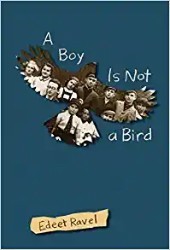November 1918: World War I just ended and the deadly Spanish flu was raging across the world. Max Shertok, a Jewish immigrant US Army Private, leaves his Big Red One fighting unit in France to rescue his parents from civil war in Russia. On his way east, he meets Rabbi Zalmund Hofitz and Deena Wojick, renegades from the Bolshevik Revolution. The pair had fought police in the mayhem of worker revolts in Poland, carried guns for the Bolsheviks in the Red Terror in Moscow, and ran contraband for the crime syndicate in the decadence of Kyiv. Together, the explosive triangle produces love, betrayal, arrest and mass murder in the chaos that consumed Europe after the Peace. Will Max make it through the Cossacks, White Army, Anarchists, Ukrainian Nationals and Bolsheviks to his parents and back home to the US? Based on real people and true stories of the most tumultuous time of the century.

Fiction
The Death of Hercules: A DocuNovel
September 1, 2020
Discussion Questions
Courtesy of Daniel Yarosh
- Foreshadowing. Many incidents in the book portray people and places that would become important in the future. For example, in 1918 the future leader of France, Charles deGaulle, was a foot soldier captured by the Germans; the future leader of post-war Germany, Konrad Adenauer, was the mayor of defeated Köln; Auschwitz was a rail center for the Austrian army; pogroms against Jews reoccurred before, during and after WWI. How does the past shape our future leaders? Is history destiny? How has the politics and pandemic of the past few years changed our future?
- Choice or Fate? Zalmund takes the view that large movements in history are events to be watched, not shaped, by people like him. He uses this to justify his participation in violent and brutal actions. Can historical destiny justify murder for a cause? What changes in morality during social upheavals or political movements? When do you have a personal obligation to intervene, or can you just walk away? These questions are as important during the Russian Revolution as during The Capitol Riots of January 6, 2021.
- Love Triangle. Times of great upheaval can make romance more poignant. Shared risks and surviving danger together can be intoxicating. What was the basis for Zalmund and Deena’s love affair? Were they both outcasts with shared values, or simply two who were thrown together in chaos? Why did Max feel that he had to save Deena and from what? What did Deena really want? Sometimes in the middle of a love affair we are not able to see clearly our own self-interests.
- The Death of Hercules. The Myth of Hercules ends with his human-half death and ascent to Olympus because of the unintended betrayal by his wife Deianira. Was Max betrayed by Deena? Did Zalmund intend to eliminate Max as his rival? Or was this all the result of unintended consequences? We have all seen good intentions go badly because of the unintended consequences of our actions. Are we responsible for dangerous acts because we mean well?
- The events of Katowice versus Genesis:34. The story of Zalmund in Katowice follows the Genesis story, where the kidnapping and rape of a woman results in the execution of all the gang members and much of the family. In the Genesis story this includes all the family of the gang and confiscation of all their property. In potentially lethal conflict, is there a moral rule for restraint? Are members of a group or gang responsible for the actions of their leaders? This is especially relevant during urban and civilian warfare, as we saw during the recent conflict in Israel and Gaza.
- Max and his brothers decided that they had to get their parents out of Kherson, even though, or because, they had heard nothing from them for more than a year. Is this an obligation of honoring your parents – to save them even from themselves? Do you think your parents would want you to risk your life to save them?
- Family stories. We all have family stories passed down, of brave or fortunate events of our ancestors in the midst of historical change. Can you think of one? Have you ever questioned whether all or parts of the story are even true? How does the story cement the family’s perception of its history? How do stories get changed, by accident or cover-up?

Jewish literature inspires, enriches, and educates the community.
Help support the Jewish Book Council.


